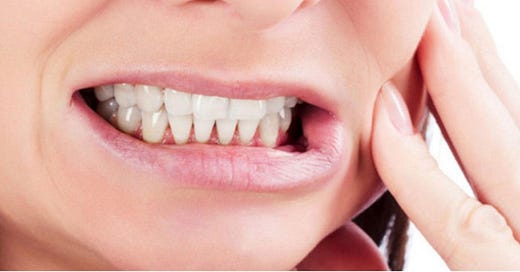What Foods or Habits Worsen Teeth Grinding?
Teeth grinding, or bruxism, is the involuntary clenching or grinding of teeth, often during sleep, leading to jaw pain and dental damage.
If you're dealing with jaw pain, headaches, or worn teeth, you might wonder, what foods or habits worsen teeth grinding? Known medically as bruxism, Teeth Grinding is often influenced by lifestyle choices and dietary triggers. Identifying and avoiding these can significantly reduce the severity and frequency of grinding episodes, particularly at night. Awareness is the first step to managing this common yet harmful condition.
Certain foods overstimulate the nervous system, leading to clenching
Habits like nail-biting and gum chewing strain the jaw muscles
Sleep and stress patterns play a big role in grinding frequency
Caffeine and alcohol are two of the biggest dietary triggers
Eliminating these factors can improve both oral and overall health
Stimulating Foods That Trigger Grinding:
Some foods and beverages act as stimulants, increasing nervous energy and jaw tension.
Caffeine-rich items like coffee, energy drinks, soda, and chocolate can overstimulate the brain and cause jaw clenching
Refined sugars in desserts and snacks may heighten anxiety and restlessness
Spicy foods close to bedtime may lead to disturbed sleep and nighttime bruxism
Artificial additives like MSG or food dyes can trigger sensitivity in some individuals
Alcohol affects muscle coordination and sleep cycles, worsening bruxism symptoms
Monitoring your diet and reducing these items may lead to noticeable relief.
Harmful Habits That Exacerbate Bruxism:
Daily behaviors can unintentionally reinforce jaw tension and teeth grinding.
Chewing gum regularly keeps jaw muscles overly active and tense
Biting nails or chewing on pens/pencils mimics grinding and adds unnecessary strain
Jaw clenching during stress or focus often becomes unconscious over time
Cradling the phone between shoulder and jaw promotes tension in facial muscles
Bruxism during exercise, like weightlifting, can become habitual without proper awareness
Becoming mindful of these habits is essential for retraining muscle behavior.
Poor Sleep Hygiene and Its Impact:
Inconsistent or poor-quality sleep contributes significantly to bruxism, especially during REM cycles.
Late-night screen time overstimulates the brain and delays relaxation
Irregular sleep schedules confuse the body’s natural circadian rhythm
Sleeping on your stomach can misalign the jaw and increase tension
Uncomfortable pillows or mattresses lead to poor neck and jaw support
Sleep apnea or snoring may increase night grinding due to oxygen interruption
Improving your sleep environment and routine can greatly ease nighttime teeth grinding.
Emotional and Mental Health Triggers:
Stress and anxiety are among the most common underlying causes of bruxism.
High-stress jobs or school demands often lead to subconscious grinding
Unresolved emotional issues may express themselves through jaw tension
Anxiety disorders commonly involve physical manifestations like clenching
Perfectionist tendencies or internalized pressure can fuel grinding habits
Lack of relaxation practices keeps the nervous system in overdrive
Incorporating mindfulness or therapy can make a significant difference in managing bruxism caused by emotional stress.
Diet and Hydration Habits That Help or Hurt:
The way you eat and hydrate can either support or sabotage your efforts to reduce Teeth Grinding Treatment.
Skipping meals or eating too fast may create jaw tension during chewing
Dehydration causes muscles to stiffen, increasing the likelihood of clenching
Excessive chewing on hard foods like nuts or ice can fatigue the jaw
Balancing magnesium and calcium helps regulate muscle function
Choosing anti-inflammatory foods can ease TMJ-related tension
Consistent hydration and nutrient-rich meals promote overall muscle relaxation.
Creating Healthier Alternatives:
If you’re asking what foods or habits worsen teeth grinding, the good news is that many of them can be replaced with healthier choices.
Replace caffeinated drinks with herbal teas or warm water
Choose crunchy vegetables instead of chewing gum for oral stimulation
Practice mindful eating to reduce stress and tension at mealtime
Use stress management tools like journaling or deep breathing
Try jaw stretches or massages instead of clenching when stressed
Proactive changes in daily routine can gradually reduce the frequency and intensity of grinding.



